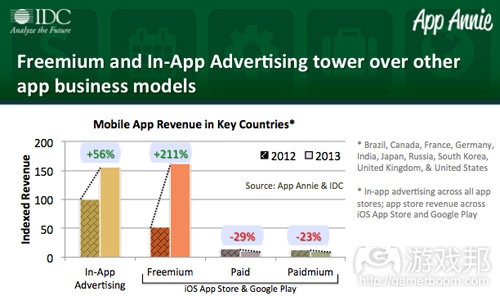每日观察:关注2013年免费模式手机应用收益增幅(3.28)
1)移动分析公司App Annie及IDC最近报告显示,2013年采用免费模式的手机应用收益增长211%,iOS和Google Play平台前1000名热门应用中,采用这一模式的应用占比高达83%,这些应用所创造收益占比更是高达92%。
App Annie所调查的50%以下开发者声称主要通过提供额外内容收费,免费模式创收的关键在于获取更高比例的付费用户,但令有不到5%的开发者反映,有超过30%的用户曾购买应用中的内容(游戏邦注:App Annie与IDC调查样本为2000名游戏开发者)。
事实上,80%开发者表示不到5%的用户曾经执行过一次IAP交易。
美国仍是应用收益最为领先的市场,2013年该收益增长1.7倍,日本和韩国发展速度更快,分别增长2.2倍和2.3倍。印度应用收益则增长3倍,预计从2013年至2017年将增长870%。
仅有不到半数受访者使用应用内置广告模式创收,58%开发者声称自己根本不使用应用内置广告。值得注意的是,75%至90%的开发者反映自己每月所有应用广告收益仅为1万美元。
App Annie还指出,极少数应用每月收益能够突破10万美元(但《Flappy Bird》是一个例外)。尽管选择广告模式创收的开发者数量相对较少,但报告也指出应用内置广告收益到2017年将超过PC展示性广告收益。
2)据gamasutra报道,《Threes》开发团队最近发表博文指出,开发者只要发布了一款出色的游戏,就很快会在应用商店看到类似的仿制品或山寨游戏。同时也表示,他们相信模仿就是最高形式的赞美,但还是希望模仿最好能够发生在他们缓慢走下顶点的时候,而不是他们自己的游戏才刚面世之时。
该团队同时也承认,当今快速发展的技术和创意正是这种模仿现象大行其道的根源之一,只是其速度之快仍然令他们十分沮丧。
3)据venturebeat报道,美国联邦贸易委员会最近开始展开针对科技公司是否违反儿童网络隐私保护法(COPPA)的调查,并指出那些违反这一法案的移动广告营销人员及其他出售儿童隐私信息的公司每次可能将被处罚1.6万美元。这里的每次是指每次违返COPPA规定的应用下载或登录行为。
4)据venturebeat报道,GameStop日前宣布关闭旗下的Spawn Labs这家基于云游戏服务的调研部门,原因是GameStop认为用户并不需要此类服务,而将把重心转向索尼PlayStation Now服务(将将PS3游戏转移到包括PS4和Vita等多种设备的服务)。
GameStop投资者关系副总裁Matt Hodges表示,虽然云游戏服务是富有创新和潜力的革命性技术,但游戏消费者尚未做好接受此类服务的准备,因此目前暂时无法围绕这一技术打造可持续发展的项目。观察者认为他此番话可能与成立于2010年的云游戏公司OnLive有关,该公司的服务(支持玩家每月支付15美元,然后在任何设备上访问自己的Steam游戏)虽然能够将AAA游戏传送到网络上,但该公司却没有吸引于足够的用户,因此不得不在2012年8月破产。(本文为游戏邦/gamerboom.com编译,拒绝任何不保留版权的转载,如需转载请联系:游戏邦)
1)Mobile app monetization: Freemium is king, but in-app ads are growing fast
John Koetsier
Freemium revenue for mobile apps was up 211 percent last year, according to a new report from mobile analytics company App Annie and IDC.
Clearly, free is working.
While a fairly strong majority — 83 percent of the top thousand apps on each of the iOS app store and Google Play — monetize via freemium, an even bigger proportion of revenue generated by those top 2,000 apps arrives via freemium: 92 percent.
We’re studying mobile game monetization.
Freemium monetization includes various forms of in-app purchases, such as purchasing virtual goods like upgrades or speed-ups, buying additional functionality like levels or content, buying more time to use the app, paying to remove ads, or a combination of them all. The New York Times app, for instance, allows you to view a certain number of articles but blocks the rest unless you subscribe.
The most common option according to the survey is offering additional functionality for a price, with over 50 percent of App Annie’s developer respondents indicating that this was their preferred method.
Naturally, the key to success as an app developer who uses the freemium model is getting as large a percentage of your free users buying something as possible. That’s a significant challenge, however, with fewer than five percent of developers reporting that more than 30 percent of their users had bought something in the app.
In fact, 80 percent of developers reported that less than five percent of their users made even one single in-app purchase.
The U.S. still leads in app revenue, with 1.7x growth last year, while Japan and South Korea are growing at higher multiples (2.2x and 2.3x, respectively) on smaller bases. India is seeing growth triple, albeit from a very low starting point, and should see app revenue jump by 870 percent from 2013 levels to 2017.
Interestingly, less than half of the developers surveyed said that they used in-app advertising, as 58 percent said that they did not use ads in their apps. Once again, there’s a steep curve to actually start making any money, with ad revenue from all of a developer’s apps only hitting $10,000 a month in the 75th to 90th percentile.
Very rarely, breakout apps can make over $100,000 per month, App Annie said, which of course is what Flappy Bird experienced.
Despite the lower numbers of developers choosing ad-based revenue models currently, the study says that mobile in-app ad revenue will surpass PC display ad revenue by 2017. IDC numbers cited in the report suggest that the proportion of ad revenue to total app revenue will grow in every major mobile market by that point, with U.S. edging up to around the 60 percent level; Germany, the UK, France, and Brazil growing significantly; and only South Korea and Japan remaining below the 50 percent mark.(source:venturebeat)
2)Understanding Threes: Developers release design archives
By Christian Nutt
“We do believe imitation is the greatest form of flattery, but ideally the imitation happens after we’ve had time to descend slowly from the peak — not the moment we plant the flag.”- an excerpt of a longer statement by the Threes development team.
A new post has popped up on the Threes site which gets at the heart of today’s mobile game landscape: Release a great game, and it won’t be long before it’s outright copied or
reinterpreted, and that reinterpretation or copy is up on an app store.
It happened to Threes, of course. “This fast, speed-up of technological and creative advances is the lay of the land here. That’s life! That’s how we get to where we’re going. Standing on each others shoulders,” the developers write, “but piling on top of us right when the majority of Threes players haven’t had time to understand all we’ve done with our game’s system and why we took 14 months to make it, well… that makes us sad.”
Whether it’s to show off the hard work that went into the deceptively simple game, or just as a contribution to the game design space, the post comes alongside a huge dump of emails between developers Asher Vollmer and Greg Wohlwend — including lots of design prototypes. The discussion takes in every aspect of the development process for the game.
If you truly want to understand Threes, they seem to be saying, check out all the work we’ve done — and then build on it.(source:gamasutra)
3)Feds to mobile marketers: Stop targeting kids, or else (exclusive)
Richard Byrne Reilly
The feds are focusing their investigative attention on the surging mobile ad space.
The Federal Trade Commission has begun aggressively going after tech companies suspected of violating the Children’s Online Privacy Protection Act, the FTC told VentureBeat exclusively.
The move comes after the FTC tweaked COPPA last year, giving online advertisers, gaming outfits, and others a so-called grace period to adapt to the rapidly changing online mobile advertising space or face the consequences.
That grace period is now over, and the FTC is coming after companies that are not in compliance with the new rules.
Mobile ad marketers, ad retargeters, and other firms that are caught selling information or otherwise violating COPPA statutes will be fined up to $16,000 per infraction. That translates into $16,000 for each app download or login where COPPA is being violated.
“The FTC remains committed to protecting children’s privacy online, even as mobile technology continues to evolve quickly — that’s what the revisions to the COPPA rule were about,” Mark Eichorn, the FTC’s assistant director of privacy and identity protection, told VentureBeat.
“In the mobile space, behavioral advertising to children is an area where we intend use the enforcement tools at our disposal to ensure children’s privacy is protected,” Eichorn added.
The FTC declined to say which specific companies are under investigation.
COPPA was crafted by Congress in 1998 to protect children from online predators and to protect marketing firms from selling information about their Internet usage and personal details to third party data firms. When children log onto gaming sites and download apps, the information they give is, by law, supposed to remain safe with the companies they’re interacting with.
But that’s not always the case.
The move toward enforcement has broad implications for the mobile space, as some analysts warn that a small percentage of marketing outfits are illicitly selling data about children’s online habits and adults to third parties.
“The collection of information by third party marketers for (Internet) sites directed at children is illegal in itself,” Eichorn said. ”The grace period allowed companies serving these areas time to get their houses in order.”
The 2013 revision to COPPA broadened the act, extending the definition of children’s personal information to include “persistent identifiers such as cookies that track a child’s activity online, as well as geolocation information, photos, videos, and audio recordings,” the FTC announced last summer.(source:venturebeat)
4)GameStop closes its game-streaming division — will focus on PlayStation Now
Jeffrey Grubb
Most consumers don’t really want Netflix-style game streaming, at least according to GameStop.
The retailer announced today that it closed its Spawn Labs research division, which was building a cloud-gaming service that would have enabled customers to play games instantly over the Internet. GameStop doesn’t think consumers want something like that yet. It instead plans to focus on selling cards for Sony’s upcoming PlayStation Now service, which will stream PlayStation 3 games to a variety of devices, including PS4 and Vita.
“While cloud-based delivery of video games is innovative and potentially revolutionary, the gaming consumer has not yet demonstrated that it is ready to adopt this type of service to the level that a sustainable business can be created around it,” GameStop vice president of investor relations Matt Hodges said.
He is potentially referring to streaming company OnLive, which attempted to start a cloud-gaming business in 2010. While the service is capable of streaming triple-A releases online just like Netflix does for film, OnLive has failed to attract a critical mass of customers despite trying a number of business models. It went bankrupt in August 2012. It announced a new strategy, which will enable gamers to access their Steam games from any device for a monthly fee of $15.(source:venturebeat)










































 闽公网安备35020302001549号
闽公网安备35020302001549号